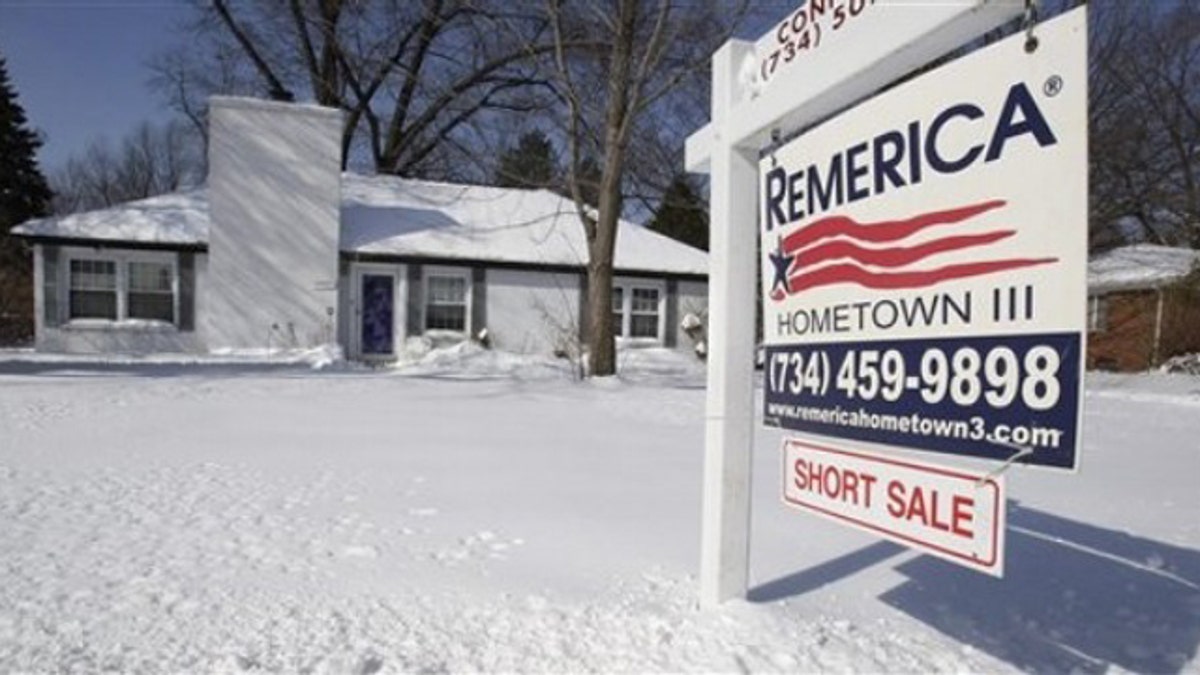
This Feb. 23 picture shows a foreclosed house for sale in the Detroit suburb of Southfield, Mich. (AP)
The author of a study claiming the U.S. housing collapse is now worse than during the Great Depression warned Wednesday that the market likely will continue to fall for the rest of the year before going stagnant.
Paul Dales, senior U.S. economist for Capital Economics, predicted home prices would fall another 3 percent over the rest of 2011 before potentially hitting bottom.
"Even when that happens, I don't think we're going to see any significant or sustained rises," he told FoxNews.com Wednesday, predicting "a couple years of pretty much no recovery whatsoever."
The bleak prediction comes after he released a report estimating that since the collapse began from the pricing peak of 2006, prices have fallen 33 percent -- more than the 31 percent dive recorded between the 1920s and 1930s.
The data underscores the trouble the U.S. economy is having emerging from what is described as the worst recession since the Great Depression. "The sharp fall in house prices in the first quarter provided further confirmation that this housing crash has been larger and faster than the one during the Great Depression," the analysis said.
Dales said the collapse has eclipsed that of the Great Depression because the boom that preceded it was much bigger. Unlike during the 1920s, access to the housing market was far more open leading up to 2006.
"This boom was characterized by homeownership becoming the norm for pretty much anyone," Dales said, noting that the boom has effectively been thrown in reverse.
While the financial markets have partially bounced back since the 2008 Wall Street collapse and the economy as a whole has been growing, the employment picture is bleak and housing continues to suffer.
The national jobless rate ticked up to 9.1 percent in May -- that was after the Standard & Poor's/Case-Shiller index issued a report showing home prices in a dozen metropolitan regions hit their lowest level in March since the collapse began. Nationally, prices hit a new post-collapse low in the first quarter, and have returned to roughly 2002 levels.
David Blitzer, chairman of the Index Committee, declared the numbers confirmed a "double-dip in home prices." He and other analysts suggested the U.S. housing market has not yet hit bottom.
The dismal housing market news was compounded Wednesday by the National Association of Home Builders' release of its monthly Housing Market Index. The index, which measures builder sentiment on the market, fell to a level of 13 on its 100-point scale. That's three points below the previous month and the lowest level since September 2010. Any reading below 50 indicates negative sentiment about the market.
With fewer homes being built, fewer jobs are available and less revenue is generated for local, state and federal governments. Each new home built creates an average of three jobs for a year and generates about $90,000 in taxes, according to the group.
On the bright side, the NAHB noted that a poll it took of 2,000 2012 voters found that housing is still considered by the largest plurality of homeowners as their biggest investment.
Amid the troubling developments in housing, labor and elsewhere, the Obama administration has tried to push several new economic proposals, ranging from new training programs to tax relief.
President Obama is pleading for patience on the economy while at the same time urging the public to stay positive.
"The sky is not falling," the president said during a stop in North Carolina two days ago.




